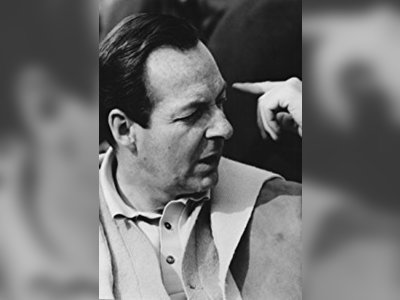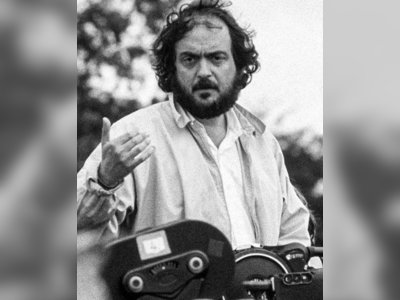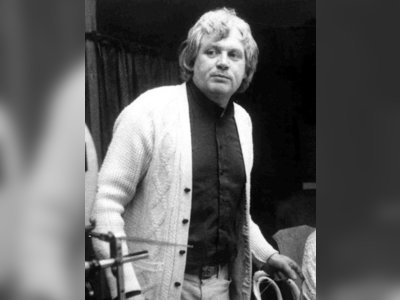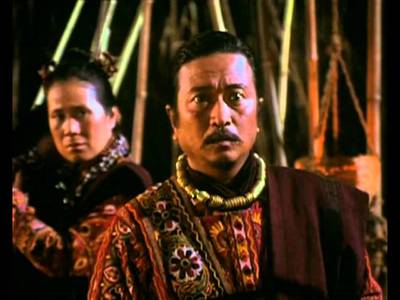British Heritage
Remember, Cherish, Learn.
beta
Nicolas Roeg - From Tea Boy to Film Director
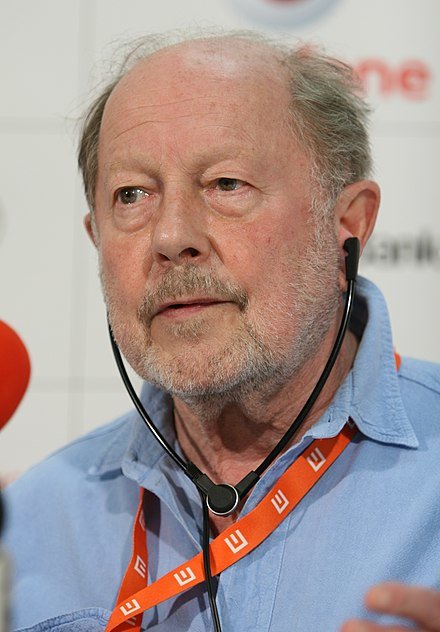
Crafting Cinematic Masterpieces and an Iconic British Legacy.
An artistic visionary, Nicolas Jack Roeg CBE BSC (1928–2018) left an indelible imprint on British film history, contributing significantly to the British cultural heritage through his avant-garde cinematographic techniques and thought-provoking narratives. His style, unorthodox and innovative, traversed the conventional boundaries of storytelling, creating a unique cinematic language that reverberated throughout the global film industry. Roeg's creative journey from humble beginnings to the zenith of the film world reflects not just his mastery and innovation, but also a quintessentially British penchant for perseverance and individuality. This article examines the life, works, and legacy of this cinematic genius, delving into his immense influence on global cinema.
Roeg was born in St John's Wood in North London on 15 August 1928. Following his completion of National Service in 1947, he embarked on a journey in the film industry, starting at the bottom rung of the ladder as a tea boy at Marylebone Studios. From this modest position, Roeg steadily ascended the ranks, displaying an unflinching commitment to his craft, while his innovative vision often found him at odds with mainstream cinematic conventions.
After working on numerous productions in varying capacities, Roeg made his directorial debut in 1970, a full 23 years after his entry into the film industry. He soon became recognized for his idiosyncratic narrative and visual style, making waves with his disorienting editing techniques. This distinct approach propelled him to the forefront of influential filmmakers, inspiring future cinematic mavericks such as Steven Soderbergh, Christopher Nolan, and Danny Boyle.
The British Film Institute, acknowledging Roeg's profound influence, named two of his films, "Don't Look Now" and "Performance," among the 100 greatest British films of all time. This recognition cemented his position as a pillar of the British film industry and underscored his substantial contribution to British heritage.
Roeg's cinematographic journey began with small roles in films such as "The Sundowners" and "The Trials of Oscar Wilde." However, his talent didn't go unnoticed for long, leading him to work as a second-unit cinematographer on David Lean's legendary "Lawrence of Arabia." His first directorial venture, "Performance," challenged traditional film norms, garnering critical acclaim for its unconventional narrative style and experimental editing techniques.
Roeg's subsequent films, including "Walkabout," "Don't Look Now," "The Man Who Fell to Earth," and "Bad Timing," further solidified his reputation as a daring innovator. He made a habit of casting musicians in leading roles, adding an additional layer of novelty to his films. Despite occasional resistance and criticism from distributors and critics, Roeg's groundbreaking cinematic style established him as a trailblazer in the film industry.
Roeg's narrative style often incorporated a mosaic-like montage, replete with elliptical details that would only acquire significance later in the film. He shattered traditional chronological order, creating disjointed and fragmented narratives that required viewers to piece together the storyline actively. This innovative approach to storytelling not only created engaging and unique film experiences but also inspired a new generation of filmmakers.
Roeg's influence extended beyond narrative deconstruction; his innovative techniques presaged many used in modern music videos. For instance, the "Memo from Turner" sequence in "Performance" was ahead of its time, setting a precedent for future music video production. Roeg’s innovative narrative techniques and profound thematic explorations turned his films into cinematic puzzles that challenged and enthralled viewers.
In recognition of his immense contribution to the British film industry, Roeg was awarded a British Film Institute Fellowship in 1994. Two years later, he was made a Commander of the Order of the British Empire. His work was celebrated at the Riverside Studios in London in 2008, with several of his films being showcased over three days. Roeg's unique style and experimental storytelling techniques continue to inspire modern filmmakers, reinforcing his enduring legacy.
Nicolas Roeg’s life, work, and legacy are integral to the narrative of British film history. From his earliest days in the industry to his acclaimed directorial ventures, Roeg constantly pushed boundaries, crafting unique cinematic experiences that continue to captivate audiences. His contribution to British heritage is undeniably significant, offering not only a vast array of groundbreaking films but also a powerful influence on generations of filmmakers. Roeg’s pioneering spirit and enduring passion for innovation affirm his place as one of Britain’s most influential and treasured film directors.
From Humble Beginnings to Cinematic Excellence
Roeg was born in St John's Wood in North London on 15 August 1928. Following his completion of National Service in 1947, he embarked on a journey in the film industry, starting at the bottom rung of the ladder as a tea boy at Marylebone Studios. From this modest position, Roeg steadily ascended the ranks, displaying an unflinching commitment to his craft, while his innovative vision often found him at odds with mainstream cinematic conventions.
After working on numerous productions in varying capacities, Roeg made his directorial debut in 1970, a full 23 years after his entry into the film industry. He soon became recognized for his idiosyncratic narrative and visual style, making waves with his disorienting editing techniques. This distinct approach propelled him to the forefront of influential filmmakers, inspiring future cinematic mavericks such as Steven Soderbergh, Christopher Nolan, and Danny Boyle.
The British Film Institute, acknowledging Roeg's profound influence, named two of his films, "Don't Look Now" and "Performance," among the 100 greatest British films of all time. This recognition cemented his position as a pillar of the British film industry and underscored his substantial contribution to British heritage.
Breaking Boundaries in Cinematography and Directing
Roeg's cinematographic journey began with small roles in films such as "The Sundowners" and "The Trials of Oscar Wilde." However, his talent didn't go unnoticed for long, leading him to work as a second-unit cinematographer on David Lean's legendary "Lawrence of Arabia." His first directorial venture, "Performance," challenged traditional film norms, garnering critical acclaim for its unconventional narrative style and experimental editing techniques.
Roeg's subsequent films, including "Walkabout," "Don't Look Now," "The Man Who Fell to Earth," and "Bad Timing," further solidified his reputation as a daring innovator. He made a habit of casting musicians in leading roles, adding an additional layer of novelty to his films. Despite occasional resistance and criticism from distributors and critics, Roeg's groundbreaking cinematic style established him as a trailblazer in the film industry.
A Style That Transformed Cinema
Roeg's narrative style often incorporated a mosaic-like montage, replete with elliptical details that would only acquire significance later in the film. He shattered traditional chronological order, creating disjointed and fragmented narratives that required viewers to piece together the storyline actively. This innovative approach to storytelling not only created engaging and unique film experiences but also inspired a new generation of filmmakers.
Roeg's influence extended beyond narrative deconstruction; his innovative techniques presaged many used in modern music videos. For instance, the "Memo from Turner" sequence in "Performance" was ahead of its time, setting a precedent for future music video production. Roeg’s innovative narrative techniques and profound thematic explorations turned his films into cinematic puzzles that challenged and enthralled viewers.
Honours and Legacy
In recognition of his immense contribution to the British film industry, Roeg was awarded a British Film Institute Fellowship in 1994. Two years later, he was made a Commander of the Order of the British Empire. His work was celebrated at the Riverside Studios in London in 2008, with several of his films being showcased over three days. Roeg's unique style and experimental storytelling techniques continue to inspire modern filmmakers, reinforcing his enduring legacy.
Conclusion
Nicolas Roeg’s life, work, and legacy are integral to the narrative of British film history. From his earliest days in the industry to his acclaimed directorial ventures, Roeg constantly pushed boundaries, crafting unique cinematic experiences that continue to captivate audiences. His contribution to British heritage is undeniably significant, offering not only a vast array of groundbreaking films but also a powerful influence on generations of filmmakers. Roeg’s pioneering spirit and enduring passion for innovation affirm his place as one of Britain’s most influential and treasured film directors.
- Nicolas Roegen.wikipedia.org

